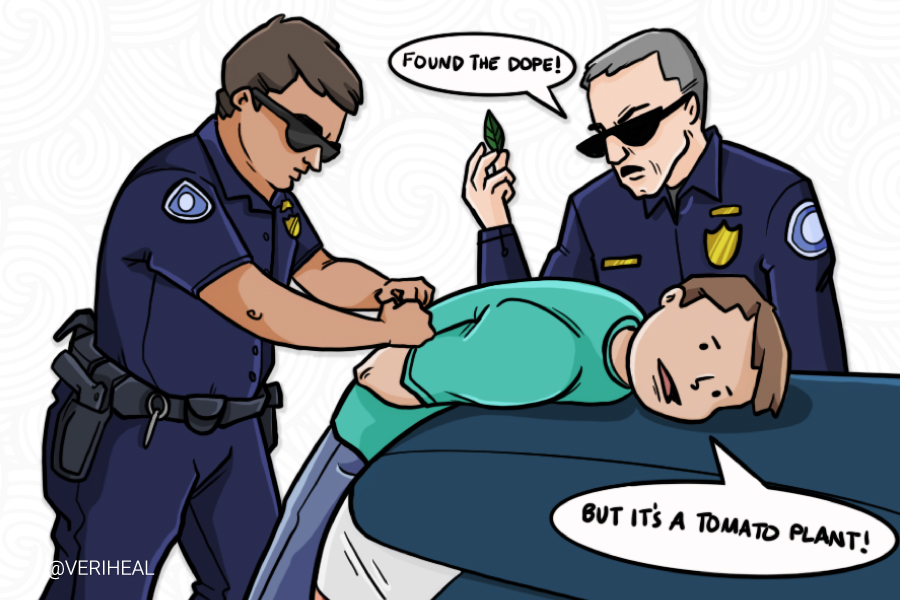The War on Drugs, a government initiative that began in the 1970s and was intended to curtail the sale and use of dangerous drugs in the United States, has had a strange and dramatic impact on cannabis. The low tolerance of War on Drugs era policies may be to blame for such mistakes as classifying cannabis as a Schedule I substance when many experts now agree that it does, in fact, have the potential to be used medically. America’s history of viewing cannabis use as a serious crime has taken a toll on minority communities as well. And, of course, we know that many cannabis-related crimes have been expunged in recent years as the country has moved toward legalization. But today we look at the surreal tale of a couple who never put a foot out of line and have been engaged in legal entanglements for years over a raid that was absolutely no fault of their own.
They Just Wanted to Grow Tomatoes in Peace
Adlynn and Robert Harte were nobody’s idea of criminals. They were former CIA agents with a penchant for gardening. And it was this passion that led Robert Harte to visit a hydroponic gardening store in 2012 for supplies to grow tomatoes, a project he hoped to carry out with his son.
Little did he know that the police had staked out that store in search of leads for an annual 4/20 marijuana arrest. The police saw Robert Harte exit the hydroponic store, equipment in hand, and jumped to the wrong conclusions. From that moment on, he was marked as a potential cannabis kingpin.
The Evidence
In need of more conclusive evidence before making an arrest, the police arrived at the Harte home that evening and went through the trash. There, they found what looked to them like everything they needed—wet vegetation.
Though the wet leaves were initially deemed innocuous, it was enough to bring the police back to the Hartes’ home for two subsequent raids, on which occasions more of the same plant material was found. Now the police felt that what they were looking at was cannabis.
The police acquired a search warrant and returned to the Hartes’ home at seven in the morning on April 20th.
Why You Should Get Your Medical Marijuana Card
Veriheal has satisfied millions of patients nationwide by giving them access to these benefits
- Larger purchase limits
- Peace of mind
- Enhanced legal protection
- Access to higher potency strains
- Save up to 25% on cannabis purchases
- Skip the line at the dispensary
The Raid
The raid on the Hartes’ home must have been alarming and traumatic for Robert and Adlynn, and for their children, aged seven and thirteen at the time. Robert had an assault rifle pointed at him and was ordered to the ground, while his wife and children were forced to sit beside the wall.
Once the house had been ransacked, however, it became clear to the police that they had taken a false step and that the Hartes had done nothing wrong. The hydroponic tomato garden was visible in plain sight, a perfectly fitting explanation for the equipment Robert had purchased.
As for the “suspicious” plant matter, it was revealed to be nothing more than used tea leaves. Though they were tested in a lab, the test used was of an unreliable nature and gave a false-positive result.
The Lawsuit Over The Wrongful Raid
The Hartes sued Johnson County, KS, for the bungled raid on their home, and the district ruled in favor of the county. The Hartes appealed to a jury trial and once again lost their case—the jury also found in favor of the sheriff’s department.
In January of 2019, the Hartes appealed again. Though the case was once more found in favor of the sheriff’s department, there was a silver lining this time—the judge acknowledged that the Hartes had done nothing wrong and that the defendants—the sheriff’s department—had acted without probable cause.
Small consolation after seven years spent seeking recompense for the invasion into their family’s home. But at the very least, the Hartes can take away the certain knowledge that they were the wronged party in these proceedings.
Author, Share & Comments
















